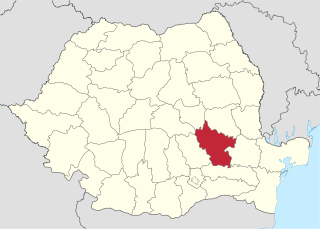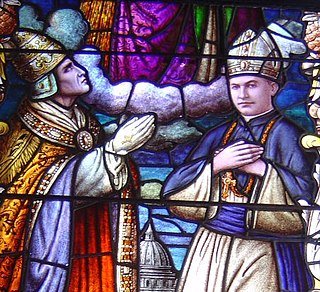
Buzău County is a county (județ) of Romania, in the historical region Muntenia, with the capital city at Buzău.
The doina is a Romanian musical tune style, possibly with Middle Eastern roots, customary in Romanian peasant music, as well as in Lăutărească. It was also adopted into Klezmer music.

Michèle Laroque is a French actress, comedian, humorist, producer and screenwriter.

Unguriu is a commune in the Buzău County, Romania, 18 km north-west of Buzău, the county capital, on the bank of the Buzău river. It is composed of two villages, Ojasca and Unguriu.

Întorsura Buzăului is a town in Covasna County, Transylvania, Romania. It administers three villages: Brădet (Bredét), Floroaia (Virágospatak) and Scrădoasa.

Sport Club Municipal Gloria Buzău, commonly known as Gloria Buzău, is a Romanian association football club based in Buzău. The team played for seven years in Liga I, the most recent presence being recorded in the 2008–09 season. Currently, the team plays in Liga III.
Ștefan Augustin Doinaș was a Romanian Neoclassical poet of the Communist era.

Crâng Park is the largest and most important park in the city of Buzău, Romania.

Stadionul Municipal is a multi-purpose stadium located near Crâng Park, in Buzău, Romania. It is currently used mostly for football matches and is the home ground of Gloria Buzău. The stadium was built between 1936–1942, on the initiative of Buzău mayor Stan Săraru. It underwent a major refurbishment between 1971 and 1976. It was refurbished again in 2007 when it was transformed into an all-seater stadium.

The Bâsca, also called Bâsca Mare in its upper course, and Bâsca Roziliei in its lower course, is a left tributary of the river Buzău, in Romania. It discharges into the Buzău near Nehoiu.

The coat of arms of Buzău is the heraldic symbol standing for the city of Buzău, Romania. The city's first recorded coat of arms dates back to 1831, and since then, the coat of arms has mostly kept its features, under different designs.

The Bogdan Petriceicu Hasdeu National College is an important high school in Buzău, Romania. It was named after the Romanian scholar and historian Bogdan Petriceicu Hasdeu. Founded in 1867, it is the oldest state-funded high-school in Buzău. Bogdan Petriceicu Hasdeu is a theoretical high school, with students ranging between grades 9 and 12, but it also has a small number of middle school classes. There are of approximately 1500 students aged between 11 and 19 years old.
Nicolae Leonard was a Romanian opera tenor, nicknamed "the Prince of the Operetta".

The Vergu-Mănăilă house is the oldest surviving building in Buzău, Romania. An 18th century boyar's mansion, renovated between 1971 and 1974, it hosts a museum of ethnography and folk art.

Alexandru Baltagă was a Bessarabian Romanian Orthodox priest, a founder of the Bessarabian religious press in the Romanian language, a member of Sfatul Ţării (1917–1918), a Soviet political prisoner, and, according to the Orthodox Church, a martyr for the faith.
During the Soviet occupation, the religious life in Bessarabia and Northern Bukovina underwent a persecution similar to the one in Russia between the two World Wars. In the first days of occupation, certain population groups welcomed the Soviet power and some of them joined the newly established Soviet nomenklatura, including NKVD, the Soviet political police. The latter has used these locals to find and arrest numerous priests. Other priests were arrested and interrogated by the Soviet NKVD itself, then deported to the interior of the USSR, and killed. Research on this subject is still at an early stage. As of 2007, the Christian Orthodox church has granted the martyrdom to circa 50 clergymen who died in the first year of Soviet occupation (1940–1941).
Local elections were held in Romania on 2 June 1996, and a runoff for mayors on 16 June 1996.
Ștefan is the Romanian form of Stephen, used as both a given name and a surname. For the English version, see Stefan.
According to Romanian archaeologist Vasile Pârvan, the river Mousaios (Μουσαίος) mentioned in a letter from Ioannis Soranus, governor of Scythia Minor, to the archbishop of Caesarea Mazaca should be identified with the modern Buzău River. The document, kept in copies at the Vatican Library and San Marco Library in Venice, tells about the martyrdom of a Christian missionary by the name of Sabbas, drowned by the Goths in the river Mousaios. Beginning with the 20th century, Sabbas has been presented as the spiritual patron of the city of Buzău as well as of several local villages.


















